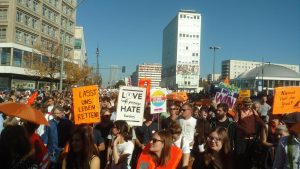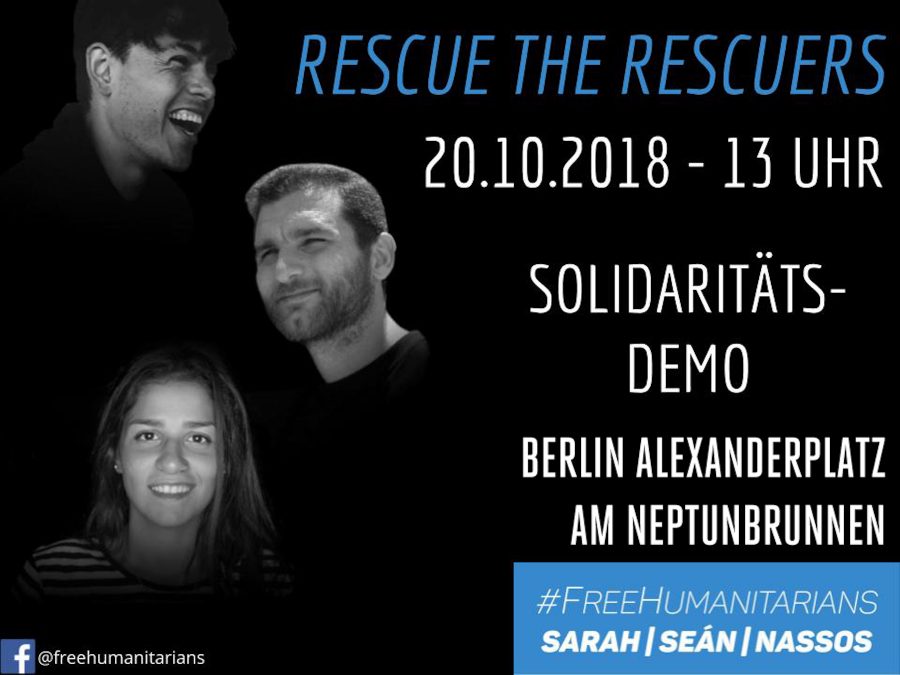240 000 people, myself included, took part in the #Unteilbar demonstration against racism and the far right in Berlin on Saturday. Hundreds of thousands of people participated, calling for an open and free society in historic numbers. #Unteilbar translates to “indivisible”. Indeed, Berlin proved that so many of its residents refuse to be divided by hateful and racist rhetoric. Rather than standing on the side of exclusion, Berlin firmly showed that we are a city of solidarity.
#Unteilbar was by far the biggest demonstration that I have ever attended, and it was definitely one of the most beautiful ones. To see so many people choosing to spend their Saturdays in the street protesting against hate and racism was heartwarming. The effective organizing of the demo gives me hope that it can be repeated in the future. Over 450 organizations, well-known people and local groups signed the call to demonstrate. This meant that, at the demonstration, many different ‘blocks’ were represented — such as the Queer block and the die Linke block.
I happened to be at the block of the international pro-refugee movement Seebrücke with BCB’s managing director Florian Becker, where we both gave speeches and called for the immediate release of Sara Mardini and Seán Binder.
Florian and I took this opportunity to speak about the fact that Sara and Seán have been in jail for more than 8 weeks now. They still face charges of espionage, money laundering, membership in a criminal organization and human trafficking. They have neither committed nor have they been proven guilty of these crimes.
“Imagine that you are 23 years old and you have just volunteered on Lesbos for eight months,” Florian asked the Unteilbar protesters to put themselves in Sara’s shoes. “Every day, you worked as a translator for refugees, in a clinic that exists only because, every day, the state and EU-financed clinic sends away dozens of refugees. Every day, you did the camp’s laundry in washing machines for which you had to raise the money yourself. Every day, you monitored the coast and helped get people off rubber boats because the coast guard doesn’t have enough people or enough boats. Now you are on your way back to Berlin, to the university studies you interrupted to do all this. And you are arrested. The accusations: human smuggling, profiteering, espionage, membership in a criminal organization. In the meantime — today — you have been stuck in prison for almost two months.”
Building off of what Florian said, in my speech I tried to further contextualize why Sara and Seán’s imprisonment should be spoken about at an anti-racist demo. In Europe, people like to think that we don’t have a racism problem. There is a belief that racism is a foreign and perhaps “American” problem of white people oppressing black people. But how can anyone pretend that there is no racial violence here after the Neo-Nazi attacks on migrants and people who were perceived to be foreign in Chemnitz? After the rise of the AfD? How can we claim that we do not have a racism problem when the most contested political issue in Western Europe is still immigration and when the majority of politicians still only speak of integration rather than inclusion?

White supremacy does not only come in the form of Neo-Nazis. Racism also comes veiled in concerns about culture and immigrants’ potential effects on or corruption of the “host” culture. It comes in statements about Muslims’ incompatibility with “European” values. It comes in policies that restrict immigration and limit aid to refugees.
Is willingly letting hundreds of refugees drown in the Mediterranean not a form of white supremacy? Is closing Europe’s borders to brown people fleeing war and persecution not racism? Have these atrocities become the “European” values that we now subscribe to? I and the thousands of people at #Unteilbar reject this notion. Humanitarian aid to people in need should be a given, not a matter of political partisanship.
The overall political climate of racism is relevant to Sara and Seán’s cause firstly because they are both people of color who are currently incarcerated — Sara being a Syrian refugee and Seán being the son of a Vietnamese refugee who fled to Germany. Naturally, since they have not yet been given and might not be given the chance to prove their innocence in a fair trial for another year and a half, it is important to mention their case at an anti-racist demo such as #Unteilbar and perhaps question whether their identities had anything to do with their imprisonment. However, the implications of their incarceration definitely extend beyond the possible racial biases of the Greek prison system. Beyond possible discrimination on the basis of race/ethnicity, their imprisonment is an indication of the frightening fact that Europe’s racism problem has extended to criminalizing the humanitarianism of aid workers who have been and are helping migrants reach safer shores. When two young volunteers are sent to jail for helping refugees, this serves as a way to discourage future volunteers and sets a precedent that aid work might soon be criminalized.
As great as it was to speak about them there, a demo of this size and this sort of universality cannot bring attention to individual cases. Thus Seebrücke, BCB and other organizations have decided to organize demonstrations in several cities for the cause of these particular political prisoners. The demonstrations will call for the release of Sara Mardini, Seán Binder, and Nassos Karakitsos. Unlike Sara and Seán, Nassos’ case is a little different because he is a Greek citizen and was a Field Director and Search and Rescue Team Leader of Emergency Response Center International (ERCI), the organization that Sara and Seán volunteered for. Either way, the Rescue the Rescuers initiative calls for the release of all three currently jailed people who might have to wait for up to a year and half in prison before their trials begin.
The international community could not just sit back and watch their case be used as a way to scare off other people who might want to get involved with refugee volunteer work. So, this Saturday, the 20th of October, we are set to have demonstrations in five major cities: Berlin, Dublin, London, Stockholm and Boston. Showing up in all of these places will show the Greek authorities that we have not forgotten about this case. We demand that Sara, Seán, and Nassos be released so that they may await a fair trial outside of prison.
I ask the BCB student body that we all show up on Saturday to support our fellow classmate Sara Mardini and the two other incarcerated people who worked with her. We will meet at Neptunbrunnen at Alexanderplatz at 1 pm and march to Brandenburger Tor where there will be a rally with speeches, music and theatrical performances. Through this demo not only will we address the case of the imprisonment of these three people, but we will also be addressing Europe’s racism problem — not its supposed refugee problem. Come and speak up on behalf of the people that currently cannot.
Let us say on Saturday: Free Sara, Seán, and all political prisoners!

